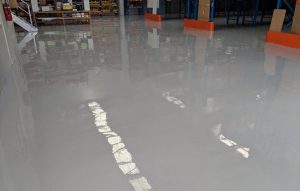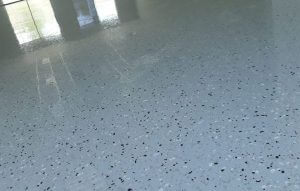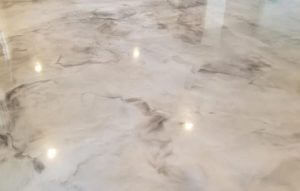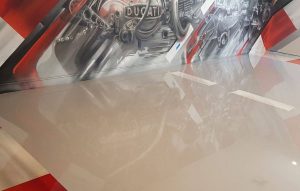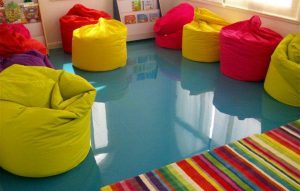Different Types of Epoxy Floor Coating
Epoxy floor coating is quite popular for industrial and commercial flooring. There happens to be a variety of epoxy that may be used on floors which include self-dispersing coatings, gravelled coatings, self-levelling coating, mortar coatings, vapour barrier coatings, terrazzo coatings, and antistatic coatings. Each type of these coatings will offer a distinct advantage and disadvantage when it is compared to others.
What Is Epoxy?
Epoxy is an adhesive, paint, plastic or other material that is created as a polymer of epoxides. It describes coatings that are created from two components, meaning, a combination mix of two different chemicals, referred to as resin. There are many benefits that come with using an epoxy floor coating, compared to using other types of resins for flooring. Most importantly, epoxy is known to be the highest-strength resin in the industry. They offer the strongest bond between the resin and reinforcement and allow for the construction of the lightest part and most durable modules.
What Is Epoxy Floor Coating?
The number one flooring option for residential, commercial and industrial applications is epoxy floor coating. Epoxy flooring is typically a two-part system consisting of Part A: resin and Part B: hardener. Specialty additives like flow control, UV inhibitors, adhesion promoters, accelerators, etc, are added to create coatings that perform well in a wide variety of flooring applications. Using these specialty additives, epoxy floor coating is formulated to achieve different desired performance characteristics like a more rapid cure, increased abrasion resistance, higher chemical resistance, higher or lower viscosity, and many others. Different pigments, decorative coloured quartz aggregate, vinyl flakes, glitter, and other additives are added to the epoxy floor resin to achieve a different performance and aesthetic characteristics. Lastly, different types of aggregate sand blends (slurry, trowel, broadcast, etc) can also be added to the epoxy as well to create thicker, more durable flooring systems, and add non-slip texture. Epoxy floor coating is an extremely versatile flooring option and can be made and applied in a large variety of performance and aesthetic characteristics.
There are a lot of epoxy coating options to choose from, it depends on what you are looking for. Here are the options that you can choose from:
Self-Dispersing Coating
This type of coating is normally used in areas that will receive a lot of forklift activity or heavy truck traffic because it has great mechanical strength. Another type of coating is made with quartz sand. That coating is used in food processing plants or locations that have liquids present because it has great anti-slip qualities.
Self-Leveling Coating
These coatings are easy to install over old and new concrete floors as they can create a seamless and smooth surface. Self-levelling epoxy coating can be used in storage facilities, office buildings, warehouses, kitchens, garages, dining rooms, and so much more.
Mortar Coating Floor
This is the strongest coating of all epoxy floors. This type of coating is normally used in heavy industrial areas and can be used to repair the cracks in other epoxy floors before laying different epoxy coatings.
Gravel Coating
This type of epoxy coating is the most decorative choice and can be used to add brand marks, decorative details, and even logotypes to the floor.
Terrazzo Coating
This type of coating is quite decorative and simple to clean. Terrazzo coatings are normally used in large areas such as entrances and hallways in schools, office buildings, and commercial buildings.
Antistatic Coating
This type of coating is used in static-sensitive areas where electronic components are in permanent use and having a static-free environment is vital for places like hospitals, electronic manufacturing plants, and laboratories.
Vapor Barrier Coating
Liquid vapor barrier epoxy is applied on top of concrete floors to give it an impenetrable surface that reduces vapor transmission to almost zero. This coating is normally added before the final flooring surface is added such as hardwood floors, carpet, tile, and sheet vinyl.
Flake Coating
This isn’t really a type of epoxy flooring, but a style of applying the coating. This type of technique adds multi-coloured chips or flakes into the coating while it is wet to give it a decorative look when finished.
100 Percent Solids Coating
This happens to be the most durable type of epoxy material, which a professional installer will recommend and use. This coating will last around 20 years, especially when it is used for heavy human traffic areas where surfaces need protection from possible abrasions, chemical reactions of chemical substances and hot tire marks. These installers will use hardeners that allow the coating to dry into a solid form, while it bonds with the concrete.
Water Based Coating
This type of coating is more of a primer and sealer because it spreads thinly and doesn’t possess the same resistance and durability as 100% solid coating does. This is the type of coating that is included in a DIY kit that is considered more user-friendly than the others. Because of its ability to penetrate a porous surface, it is normally used as a sealer or primer over degreased concrete surfaces. It does give concrete a smooth and glossy surface as well as protective qualities against abrasions, chemical reactions, and stains.
Solvent Based Coating
Just like the name has implied, this type of coating uses solvents when it is used as a floor primer and sealer, just like the water-based type. Solvent-based epoxies will contain solids that range from 30% to 70%, which gives you a really thin layer. Because its nature is a solvent-based floor coating it makes it a less favourable choice, as the type or amount of solvent that is used is normally noncompliant with the VOC or Volatile Organic Compound regulations. Out of these coatings, DIY and Chicago installers will hardly ever include a solvent-based coating as a primer or sealer in epoxy floors.
These are the different options you can choose from. You need to make sure what the best fit is for you so that the coating lasts long and would fit perfectly on what portion you want it to be coated. Epoxy floor coating is widely used in Sydney. Epoxy driveway Sydney is very common as they provide the best benefits for driveways. Garage epoxy flooring is also very common and is the most used option for many homeowners.
Although this may seem to be up to you, it is always good to seek advice from epoxy flooring experts as they know much better than us. Epoxy floor coating provides numerous benefits for you and your home or business.
Here are the pros and cons of epoxy flooring.
Decision-making has always been a daunting course of action, especially when it involves a lifetime investment or one that will scratch your bank funds off. And choosing a flooring solution for your residential property or commercial establishment is no easy task to begin with. We know for a fact that in any given industrial space, most of its functionality relies on the floor layout and structure. It sets the ambiance and hampers the features of your real estate.
It’s best to say that at most, your choice of flooring solution from the beginning will shape the sustainability and economical duration of your property ownership. And regardless of the design style of your preference, selecting complementary flooring is imperative. Flooring is intended to withstand repeated use while preserving its impressive appeal as one of the most often-used surfaces in our homes. It’s easy to become overwhelmed by the vast number of flooring alternatives available and lose sight of the important practical considerations that must be taken into account.
When it comes to selecting new flooring systems for industrial applications, garage floor coatings, or any other outdoor surfaces based on market demand, epoxy flooring stands out from the competition for a variety of reasons. Epoxy flooring, also known as resinous flooring, is a versatile, long-lasting, environmentally friendly, and aesthetically pleasing alternative for any type of flooring surface. Epoxy flooring is desirable due to its resistance to high levels of wear and tear, which makes it one of the most long-lasting flooring options available on the market.
From its mainstream impression in the global market, it’s quite convincing to just acquire this flooring solution from all the other list of options. But here at RenuCrete, we value making informed decisions and deciding for yourself which suits your best interest the most. And to guide you through the decision process, you might want to check out this list of benefits and drawbacks before having your epoxy flooring installed;
Pros
Repellent to Damage
Epoxy flooring is exceedingly robust and of good resistance to a wide range of substances, including gasoline, grease, detergent, transmission fluid, cleaners, and more. Water and heat resistance are also characteristics of epoxy floor coating in addition to its ability to resist chemical degradation. This is one of the primary reasons why they are so widely utilized in garages and in the automobile industry in general. Another advantage of these floors is that they are resistant to mold and mildew, which makes them incredibly effortless to clean and disinfect. As a result, epoxy is a valid solution for hospitals and medical facilities.
In addition to that, the damage caused by typical wear and tear on many types of flooring in both residential and commercial settings is not a concern with epoxy coating, in contrast to many other flooring options. It is not susceptible to cracking, peeling, or eroding like laminate, wood, or other forms of flooring.
Economical Option
Epoxy flooring is fairly inexpensive per square foot when compared to multiple other types of floor coverings. The epoxy installation also does not necessitate a major revamp because it may be adhered up on the surface of the pre-existing covering. Replacement and reapplication costs are considerably lower, resulting in a more cost-effective lifetime expense for epoxy flooring. The ease with which it may be installed over the precast structure contributes to its economics. There is no requirement for an additional floor system. Additionally, the resin is a low-cost substance. Because it is a precursor of plastic, it has a very easy production process and can be installed in a relatively short period of time. Resin floorings are appropriate for big places such as warehouses because of their low maintenance requirements.
Aesthetically Appealing
Epoxy flooring is equally appealing and lasting, and it can be used to achieve any aesthetic you desire in your area. Because, compared to a typical garage floor, epoxy floors are luminous and sophisticated in appearance. It is also very simple to tidy and maintain the surface because it is smooth and even. This type of flooring makes cleanup a breeze because very little sticks to it in the first place. Epoxy coatings are also available in different finishes, including granite, metallic, marbled, and a plethora of colour combinations. In its range of colours, it adds a flawless, smooth, and elegant sheen to your coverings, while also making it crisp and new. The flooring can also be laid out in a variety of patterns and styles, both classic and personalised. Because of the variety of options available, it can elevate the ambiance of an industrial or residential space.
Cons
Slippery Tendencies
Epoxy floors provide a good amount of slip resistance. However, since oil-covered epoxy can be quite slippery, the slippery tendency is applicable to those surfaces that do not have an additional skid-resistant coating applied. A skid-resistant coating is typically considered an optional extra, but in many situations, it becomes necessary. You can avoid this problem by installing a different sort of floor, such as a brushed concrete floor, which has superior traction and provides enough grip for both vehicles and humans to navigate the space. However, when they become wet, they can become extremely slippery, creating a potentially dangerous situation. They are not a good solution for high-traffic areas where spills or water on the floor are likely to occur. But if you are able to texturize your floor, you can reduce the likelihood of this happening, at least to a certain extent.
Strong Fumes
Wet epoxy emits an unpleasant odor when it is applied throughout the application procedure. Darker colours of epoxy include a greater concentration of hardeners than lighter shades. After application, they have a distinct ammonia odor about them. Epoxy floors that have been fully cured, on the other hand, provide no health dangers unless you choose to sand the finish. Dust generated during sanding must not be absorbed due to the presence of the component chemicals. Despite the fact that garage epoxy flooring is one of the most cost-effective flooring options, this is its downside.
Lengthy Curing Time
According to the type of epoxy coating used and the severity of the project, it might take several days for epoxy flooring systems to cure entirely after they have been installed. It normally takes 72 hours for an application to dry and heal completely. Epoxy application in smaller house areas, like as garages, could, on the other hand, take as little as 24 hours. The general rule is that the floor should be allowed to dry in warm circumstances for a long period of time, preferably overnight. A slow-curing procedure produces a product that is extremely robust and long-lasting. When using the best curing products, a faster epoxy curing procedure can be used, however it is not recommended.
The curing period can be a nuisance as well if the epoxy flooring is being installed inside a home or company where there is likely to be a lot of foot movement, or if you live in a humid area since this will lengthen the time it takes for the epoxy to dry.
Contact Us Today!
And here in RenuCrete Sydney, we got you covered for epoxy flooring, flake epoxy flooring, garage epoxy flooring and all your other epoxy needs. Our well-articulated professionals in the field will surely be delighted to cater for your inquiries.
Our team has been trained and certified in concrete floor polishing Sydney techniques developed by industry leader, Elite Crete. Further, we use state-of-the-art equipment and follow a precise formula to ensure consistent, high-quality, and durable flooring for our clients. Get in touch with us to discuss our capabilities or arrange a measure and quote!
EXPERT EPOXY FLOOR COATING INSTALLATION
Get in touch with RenuCrete for more information about our Sydney Western Suburbs and surrounds concrete polishing services. Call 0410 223 300.
Get In Touch
To book an obligation free consultation or enquire in general, give us a call. We are always happy to help!

